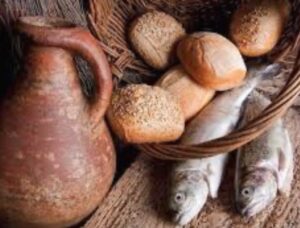 Jesus is entering the last phase of His earthly ministry. He has important things to tell His disciples, and they are worried about bread.
Jesus is entering the last phase of His earthly ministry. He has important things to tell His disciples, and they are worried about bread.
Here is the video link:
Mark 8:1-21… It’s Not About the Bread
The Audio Links are to the right i.e. Spotify and iTunes.
Here is the transcript used for this podcast:
Mark 8
Mark 8:1-13 Jesus Feeds the Four Thousand
This second exodus-like feeding (cf. 6:34–44) is in Gentile territory. (they are still in the area of Tyre and Sidon) It not only testifies again to Jesus’ identity and mission but also anticipates the Gentiles later sharing in the “children’s bread” (7:27; cf. 7:24–29), i.e., the gospel—to which Mark’s Christian community in Rome, comprising believing Jews and Gentiles, now bears witness.
Reference: Edited by Carson, D. A. (2018). NIV, Biblical Theology Study Bible. Zondervan.
1 During those days another large crowd gathered. Since they had nothing to eat, Jesus called his disciples to him and said, 2 “I have compassion for these people; they have already been with me three days and have nothing to eat. 3 If I send them home hungry, they will collapse on the way, because some of them have come a long distance.”
4 His disciples answered, “But where in this remote place can anyone get enough bread to feed them?”
5 “How many loaves do you have?” Jesus asked.
“Seven,” they replied.
6 He told the crowd to sit down on the ground. When he had taken the seven loaves and given thanks, he broke them and gave them to his disciples to distribute to the people, and they did so. 7 They had a few small fish as well; he gave thanks for them also and told the disciples to distribute them. 8 The people ate and were satisfied. Afterward the disciples picked up seven basketfuls of broken pieces that were left over. 9 About four thousand were present. After he had sent them away, 10 he got into the boat with his disciples and went to the region of Dalmanutha.
Probably on the northwestern shore of Galilee (which was more Jewish than the eastern shore).
Reference: Edited by Carson, D. A. (2018). NIV, Biblical Theology Study Bible. Zondervan.
11 The Pharisees came and began to question Jesus. To test him, they asked him for a sign from heaven. 12 He sighed deeply and said, “Why does this generation ask for a sign? Truly I tell you, no sign will be given to it.” 13 Then he left them, got back into the boat and crossed to the other side.
By this time, Jesus had raised the dead, healed lepers, made the lame to walk, and made the blind to see. There was a ton of corroboration to be uncovered with very little effort. I can totally understand Jesus’ response here.
But having said that, I can understand a little about their reticence concerning who Jesus was. They THOUGHT they knew Him. What they thought they knew was that He was from a backwater town called Nazareth, rumored to be the illegitimate son of Mary. They let what they THOUGHT they knew obscure the obvious. His words and His deeds revealed the truth. In their own religious world, only God could heal leprosy… yet on multiple occasions, Jesus healed lepers. The lame walking, the dead being raised, the blind seeing… all are fulfillment of various Messianic prophecies such as those found in Isaiah. Their predisposed ideas about what the Messiah should be like (a military leader to overthrow Rome’s rule) hid the obvious – the Messiah was standing in their midst.
This line of questioning by these Pharisees reveals that they were not interested in uncovering truth, but that they were looking for reasons to kill Him.
Mark 8:14-21 It’s not about Bread
14 The disciples had forgotten to bring bread, except for one loaf they had with them in the boat. 15 “Be careful,” Jesus warned them. “Watch out for the yeast of the Pharisees and that of Herod.”
What was it about the Pharisees and Herod that was to be avoided? Perhaps it was their arrogance – their thinking they were more important than they really were. Maybe it was their love of appearances – i.e. looking like they were the real deal, when they weren’t. Just like a little yeast affects the entire loaf of bread, giving in to arrogance – even a little – will change you…. and not in a good way.
16 They discussed this with one another and said, “It is because we have no bread.”
After discussing it awhile, the only conclusion they can come up with is that Jesus is somehow talking about real bread. Or… it could be translated as follows:
It seems best to translate it: “They discussed with one another why they had no bread.”
Reference: Barker, K. L., & Kohlenberger, J. R. (2004). The Expositor’s Bible Commentary, Abridged Edition. Zondervan.
Jesus is trying to teach them an important lesson tied to the questioning He had received from Pharisees just prior to this, and yet they put Him on ignore and are still trying to figure out why they only had one loaf of bread when so much had been left over from the miracle Jesus had just performed.
In either case, the disciples are being thick.
17 Aware of their discussion, Jesus asked them: “Why are you talking about having no bread? Do you still not see or understand? Are your hearts hardened? 18 Do you have eyes but fail to see, and ears but fail to hear? And don’t you remember? 19 When I broke the five loaves for the five thousand, how many basketfuls of pieces did you pick up?”
“Twelve,” they replied.
20 “And when I broke the seven loaves for the four thousand, how many basketfuls of pieces did you pick up?”
They answered, “Seven.”
21 He said to them, “Do you still not understand?”
The problem wasn’t that they only had one loaf. Didn’t they just see Him take a little bread and a few fish and feed a multitude? The problem (outside of the thickness of the disciples) was the influence exercised by the arrogance of the Pharisees, who thought they understood what God wanted in the way of purity and devotion. He wanted them to see the arrogance and hypocrisy of the Pharisees, and they were focused on their next meal.
This hits me hard. There have been numerous times when the next meal was in doubt. I remember one time when the Navy had misplaced my pay records, so I did not have a paycheck. We sent the kids off to school after having fed them the last bowl of cereal in the house. We honestly did not know where the next meal was coming from. Yet God provided. That was not the only time – yet in every instance, God provided. The important issue of the day – EACH day – is not where our next meal is coming from. The important issue of the day is how to walk with God – how to “love God and love our neighbor”. The important issue of the day is our learning to walk in integrity.
The disciples were arguing about bread, when the Bread of Life had something more important to communicate to them. I believe Jesus’ frustration with them was in part due to the fact that they were entering the last phase of His earthly ministry and that time was growing short.
My time is also growing short. There is less life ahead of me than there is behind me. There is no time to waste on those things I used to deem of such importance. I used to expend so much energy in promoting Paige. There is no time for that any more. It is time to focus even more intently on promoting God. Do those people that I will be leaving behind when God calls me home know what they need to know? That was Jesus’ burden at this point. It is also my burden now.
Blessings!
Paige

Mark 8:1-21… It’s not About Bread
VIEW THE COMMENTS